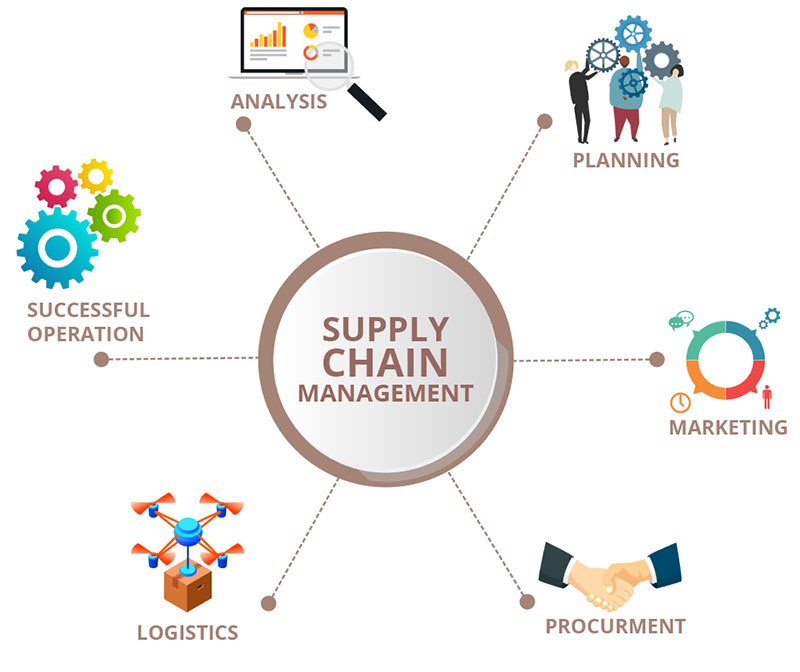Supply Chain Management (SCM)
What Are SCM Systems?
Supply chains move products from their point of origin to their point of distribution. In the past the various processes along the route from manufacture to eventual consumption involved discrete, specialist services and entities. With the progress of computerised systems, supply chain management (SCM) systems have increasingly automated and optimised SCM processes. Supply chain operators have been able to scale accordingly and have the capacity to meet ever growing global demand. Early supply chain IT systems formed disjointed solutions in a largely fragmented distribution network.
Contemporary SCM systems comprise software solutions that help manage, simplify, speed up and oversee flows of goods, services, data and finances from points of origin to final destinations of those goods and services.
Modern Supply Chain IT Systems
Supply chain activities can be anything between product development through to distribution transport, but can also support resource sourcing, production, inventory and warehouse management and shipping logistics. End-to-end SCM systems digitally connect all stakeholders for easier collaboration during product creation, order fulfilment, tracking and tracing and virtually all back office supply chain related systems across industries.
Manufacturers, wholesalers, transportation and logistics providers and retailers can now flexibly integrate their systems, with configurable permissions and functionality. Machine learning allows for more efficient product and process design, prediction of future demand, risk alert automation and improved efficiency. Sophisticated software solutions free up staff time for more creative and strategic activity and offer insights in real time of daily business process.


Every supply chain management activity you can identify has had software developed to simplify and enhance those processes; as time has gone on, however, software as a service (SaaS) providers have increasingly streamlined software for simpler integration and co-operation between historically fragmented systems.
The internet has empowered customers to demand smarter and more flexible practice. Now consumers and supply chain networks can interact with products and suppliers at any stage of the value chain, transforming how everyone does business and obliging companies to respond to a more demand-driven economy.
Order Management
An accurate, purchase order management module updated in real time supports easier collaboration, clearer control and consistent communications across your supply chain network.
Premium Freight Authorisation
End-to-end, integrated IT environment for premium freight authorisation requests, from initiation, authorisation, through to real-time tracking, strategic decision making, management and control.
Inventory Packing List
Supply chain partners can create detailed, compliant packing lists with standardized documentation. Smoother, consistent and clear communications of shipment details to logistics service providers and other partners, including accountancy and audit services.
Reprioritization and Flexible Control
Effectively monitor, manage and control schedule or transport mode and route alterations in real time. Make price alterations, re-package and change arrangements for greater quality control through flexible control functionality, based on your specific business operations.
Transparent and Trackable Orders
A comprehensive, user-friendly management dashboard provides simple shipment progress status visuals for orders throughout the pipeline, configurable by inventory categories, transport mode, supply chain vendor and more.
Automated Exception Alerts
Receive automated alerts of risks to operational and delivery performance as they arise with exception driven alerts. Generate flexibly formatted reports for compliance and strategic decision making.
Business Intelligence
Achieve deeper and wider business insights with invaluable historical, current and predictive business information on your variable parameters. Machine learning can add predictive capability to adapt to changing business patterns faster.
Transforming Supply Chain Management Networks With IT
In this new, demand-driven economy, supply chain automation is making businesses faster, more effective and allowing them to pass on cost savings achieved through supply chain IT systems that improve their performance and efficiency.
Nowadays, SCM systems could be described as an inter-connected “collection of webs”, accessible to all, 24 hours a day, with consumer focus at their heart. Their sophistication and capacity to transform businesses for the better are creating an increasingly competitive T&L environment that demands companies to regularly review their supply chain IT strategies and continue to innovate.
Transportation in supply chain management is now a demand-driven operating model, bringing together all customers, supply chain partners, processes and technologies. Cloud based, integrated capability, flexibility, configurable functions, scalability and machine learning (AI) are key to business agility and longevity.
The outmoded business model that focuses on individual cost centers is no longer fit for future surviving and thriving. Instead, transport and logistics and freight brokerage services need to recognize their supply chains as an asset and enhance inter-connectivity and efficiency innovations with all partners. Technology needs to fit the new business model.
Meeting the challenges of customer focus, venture partner accountability, compliance in complex trading environments, shorter product life cycles and fluctuating demand is now possible with a variety of flexible modules covering full supply chain operations.
For an initial business consultation on the modular or comprehensive and customised options for your business and how a complete IT system assessment could transform how you operate, contact Sdrops’s expert team for an appointment to undertake your complete, no-nonsense review and recommendation. We can advise on modular add-ons to existing IT infrastructure of small to large enterprises, or help you plan and roll out a totally upgraded system, future proofed and fit for purpose.
Non-Conformance Risk Control
Greater compliance and risk control through enhanced visibility of non-conformance (NC) processes and policies. Establish standardized and automated processes and customizable outcomes across your vendor networks.
